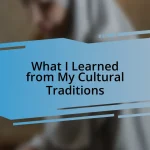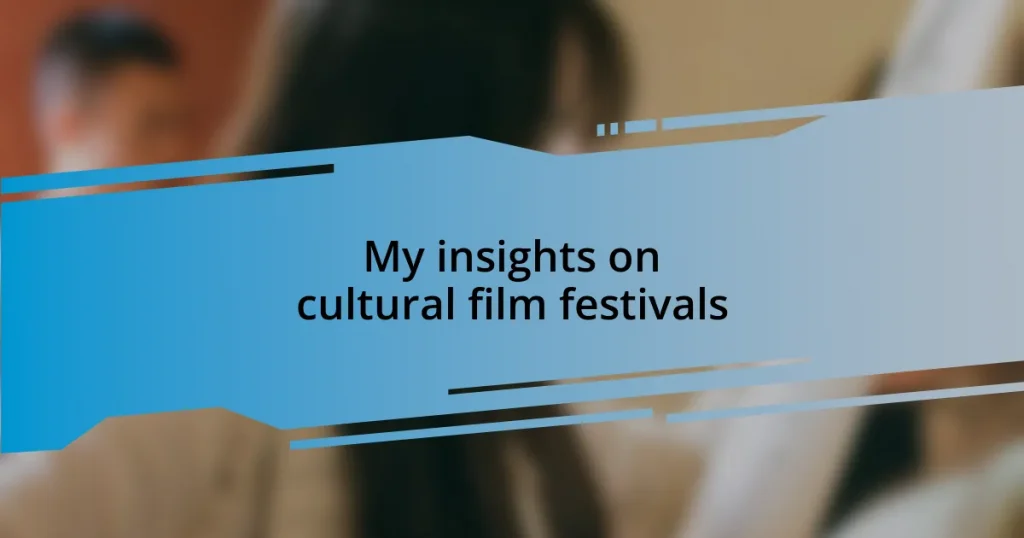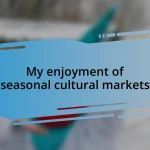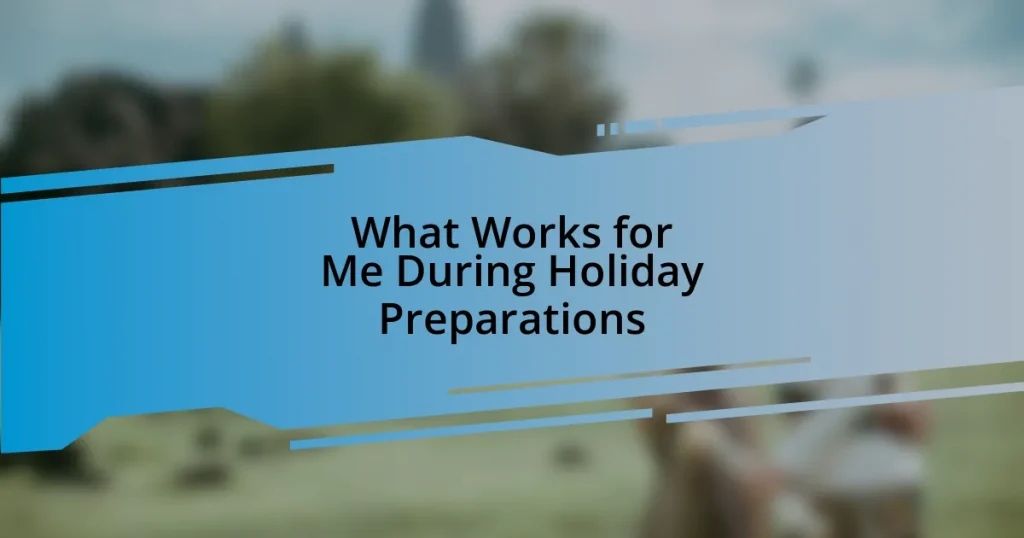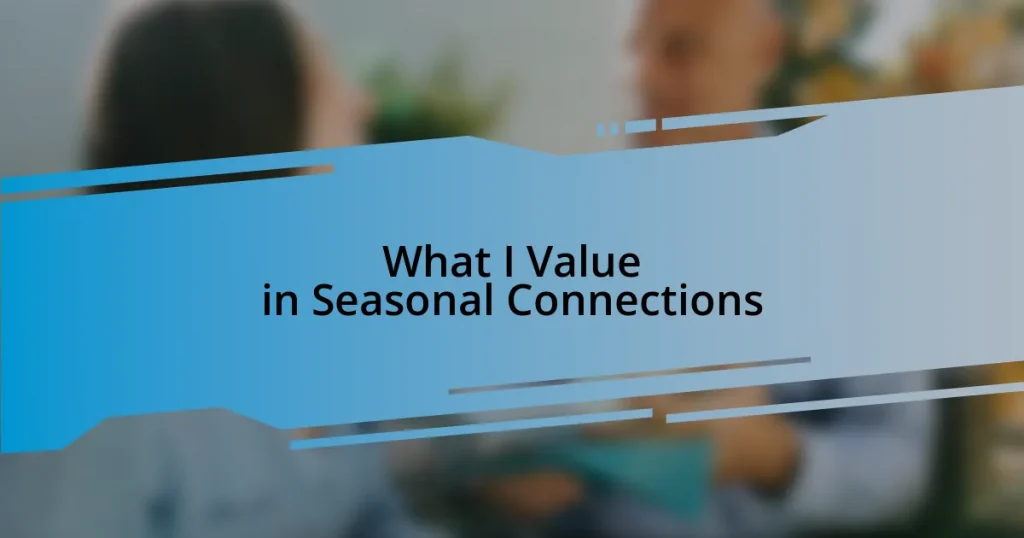Key takeaways:
- Cultural film festivals celebrate diverse storytelling, amplify underrepresented voices, and foster community connections among filmmakers and audiences.
- Networking at festivals can lead to meaningful collaborations and professional growth; engaging with others opens doors to new opportunities.
- Preparation and attention to guidelines are crucial for film submissions; the quality of the film—especially sound and editing—can significantly impact success.
- Maximizing the festival experience involves planning, embracing spontaneity, and reflecting on insights gained from screenings and discussions.
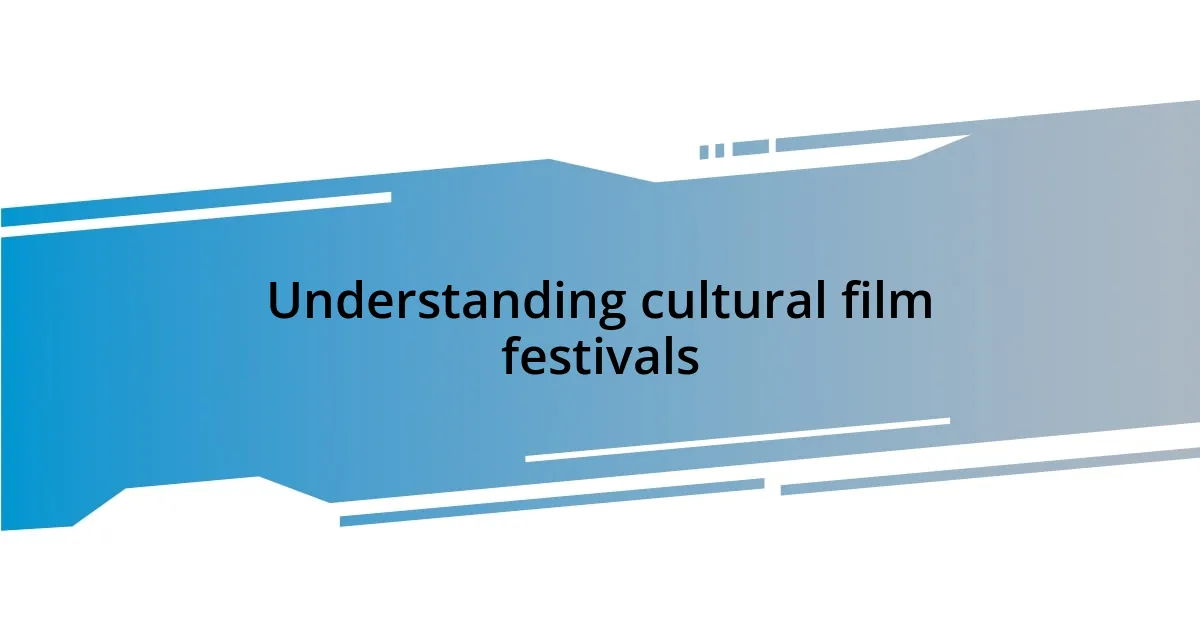
Understanding cultural film festivals
Cultural film festivals serve as vibrant platforms that celebrate the diversity of storytelling from around the globe. I remember attending a small festival in my hometown, where an intimate screening of a foreign film sparked conversations that lasted long after the credits rolled. Can you imagine how sharing these unique narratives helps us understand different cultures and perspectives?
These festivals often spotlight independent filmmakers who might otherwise struggle for visibility in a competitive industry. When I watched a documentary at one such festival that highlighted a community’s struggles, it resonated deeply with me. It raised questions about social justice, and I found myself reflecting on my own privilege and responsibility—something I believe is a testament to the powerful role these festivals play.
Moreover, they foster a sense of community among filmmakers and audiences alike. At one festival, I felt an overwhelming sense of connection as I chatted with a director whose film had touched on themes of identity and belonging. Isn’t it remarkable how a shared passion for cinema can bridge gaps between people, making us all feel a little less alone in our experiences?
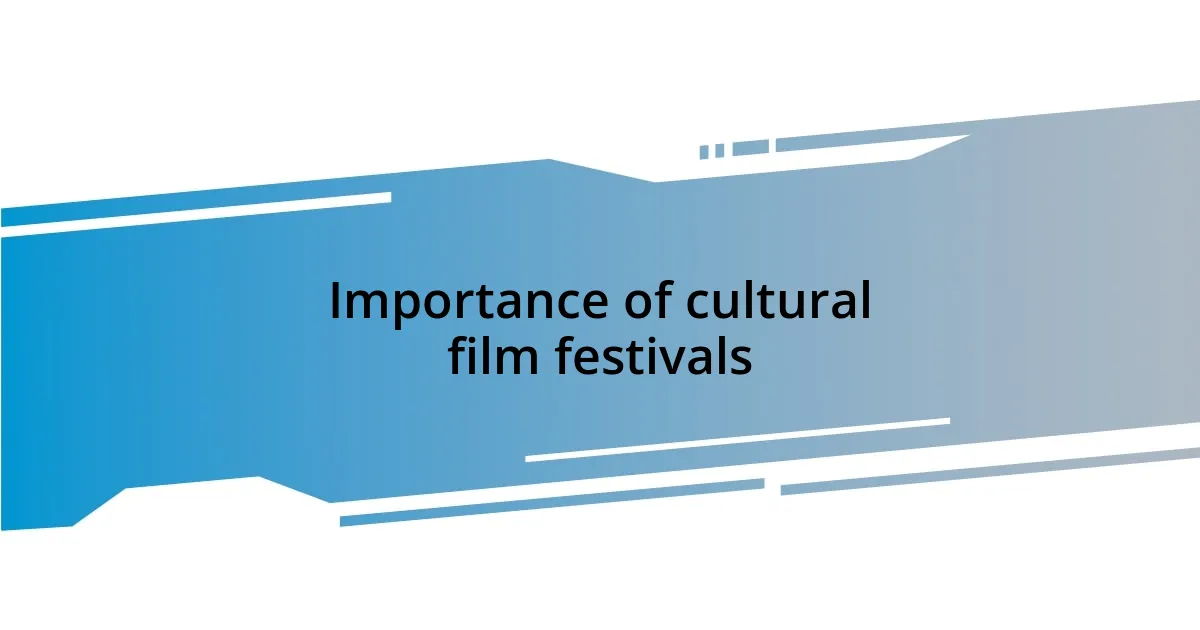
Importance of cultural film festivals
Cultural film festivals play a crucial role in promoting voices and stories that often go unheard. I fondly recall one festival where a filmmaker from a marginalized community shared his journey through a powerful short film. Watching his work, I was struck by the universal themes of hope and resilience, making me realize how these festivals can amplify diverse narratives that enrich our collective experience.
The educational aspect of these festivals cannot be understated either. I once attended a panel discussion following a screening that featured both critics and filmmakers. The dialogue was electric, with passionate exchanges about cinematic techniques and cultural representation. This kind of engagement not only deepens understanding but also encourages budding filmmakers in attendance to pursue their dreams. The practical insights shared that day pushed me to redefine how I view both cinema and culture.
Furthermore, these festivals act as a bridge between different cultures by fostering dialogues around global issues. I remember leaving one event feeling inspired and enlightened, where films addressed climate change’s effects on different communities. This exposure prompted me to think critically about my actions, demonstrating how cultural film festivals can mobilize awareness and inspire change.
| Aspect | Impact |
|---|---|
| Diversity of Perspectives | Amplifies underrepresented voices |
| Educational Opportunities | Encourages dialogue and creative growth |
| Cultural Exchange | Facilitates understanding of global issues |
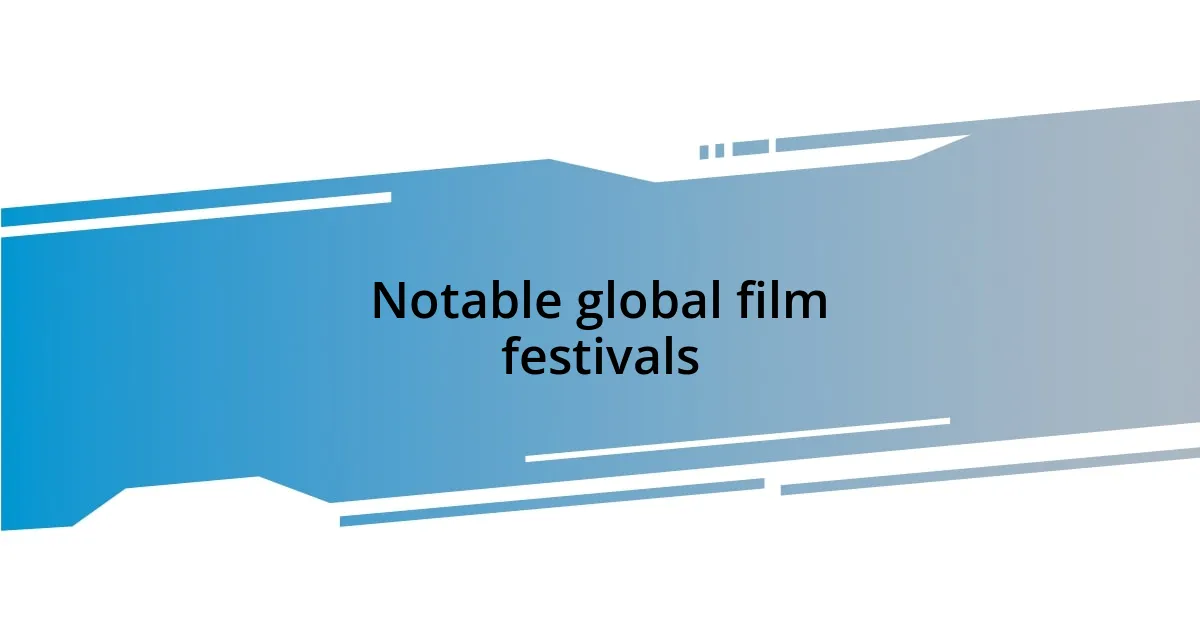
Notable global film festivals
Many notable global film festivals have garnered attention for their unique contributions to cinema and culture. The Cannes Film Festival, for example, is famous for its glamor and prestige, showcasing films that often redefine the industry. I remember watching a short clip from Cannes that left me breathless—its storytelling was so profound that I could practically feel the emotions radiating from the screen. It’s a reminder of how such festivals elevate not just films but also our collective understanding of art.
Here’s a list of some of the most influential global film festivals:
- Sundance Film Festival: Known for promoting independent filmmakers and innovative storytelling.
- Toronto International Film Festival (TIFF): A vital launching pad for films aiming for awards season accolades.
- Berlin International Film Festival (Berlinale): Renowned for its emphasis on political themes and fostering global dialogues.
- Venice Film Festival: The oldest film festival, celebrated for its rich tradition and association with classic cinema.
- Rotterdam International Film Festival: A platform for experimental and avant-garde films, encouraging new voices.
Attending some of these festivals has made me appreciate how each offers a unique flavor and focus, all contributing to the vibrant tapestry of global cinema. I once found myself engrossed in a conversation with a filmmaker who had just premiered her work at TIFF. Her passion for storytelling was infectious, and hearing about her journey from concept to screen was incredibly inspiring. Moments like these exemplify why film festivals hold a special place in my heart; they not only showcase films but also connect us to the creators behind them.
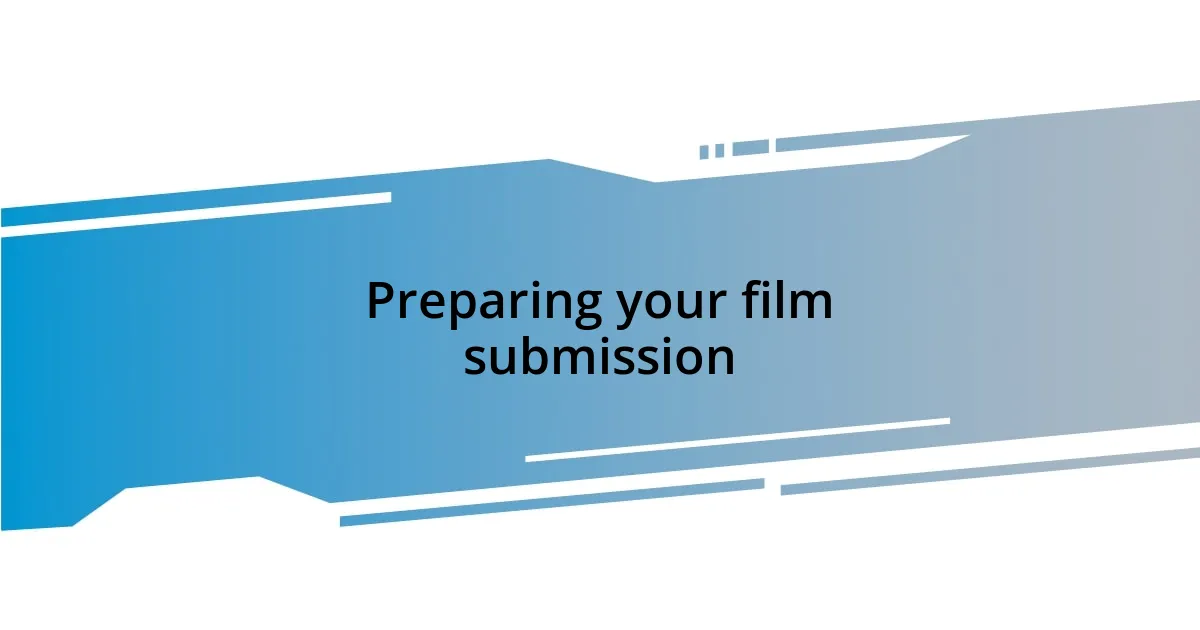
Preparing your film submission
When preparing your film submission, it’s essential to pay close attention to the festival’s guidelines. I remember the time I submitted a short film without carefully reading the requirements. It felt frustrating to realize that my work didn’t meet the specifications, leading to an unceremonious rejection. Make sure to tailor your submission materials—including the synopsis, director’s biography, and any promotional stills—according to the festival’s preferences.
The quality of your film also matters, of course. I once had a mentor who emphasized the importance of sound and editing. A technically polished film can elevate your chances significantly. I can’t stress enough how a great soundtrack can enhance storytelling; it’s like giving your audience an emotional compass. Have you ever watched a film where the music just captures the moment perfectly? Those snippets often stick with you long after the credits roll, making your film memorable.
Lastly, don’t underestimate the power of networking during the submission process. Engaging with others in the filmmaking community can lead to valuable insights and support. At my very first festival, I struck up a conversation with a fellow filmmaker in the lobby, and we ended up exchanging ideas and stories that enriched both our works. Was it intimidating at first? Absolutely. But that connection fostered a collaboration that I treasure to this day. So, keep an open mind and embrace the journey—you never know where it might lead!
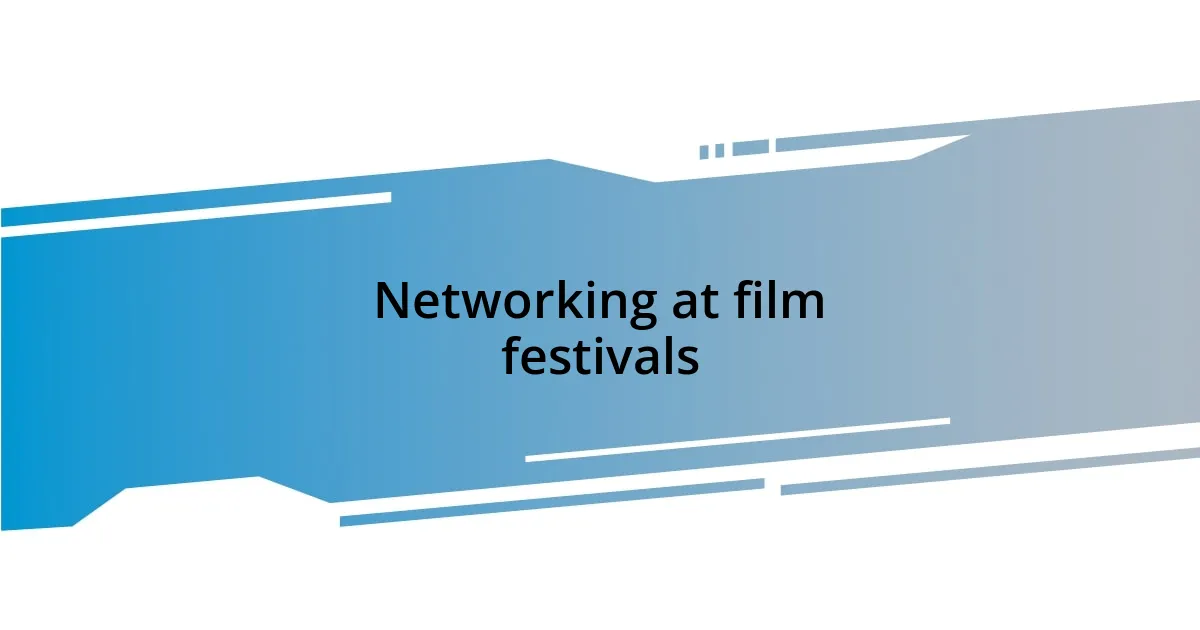
Networking at film festivals
Networking at film festivals offers a unique opportunity to build connections that can profoundly impact your career. I vividly recall the time I attended a smaller festival where I met a producer who later became integral to my project. The energy at these festivals is electric—everyone is eager to share stories and ideas. Have you ever felt that sense of camaraderie where it seems like everyone is on the same creative journey?
As I navigated the crowd, I found that casual conversations often turned into meaningful relationships. I bumped into an aspiring actor during a panel discussion, and we struck up a friendship that led to a collaboration on a short film. It’s fascinating how a single interaction can lead to unexpected doors opening. The beauty of networking in these environments is that you never know who might be your next collaborator or mentor.
Attending networking events within the festival can seem intimidating at first, but I encourage you to embrace it. I remember standing awkwardly by the refreshment table, contemplating whether to approach someone. Taking that leap was worth every second of anxiety. I ended up connecting with a seasoned filmmaker who generously shared tips on navigating the industry. That moment taught me that stepping out of my comfort zone can yield fruitful connections. Why not challenge yourself to spark a conversation the next time you’re at a festival? You might just uncover a world of opportunities.
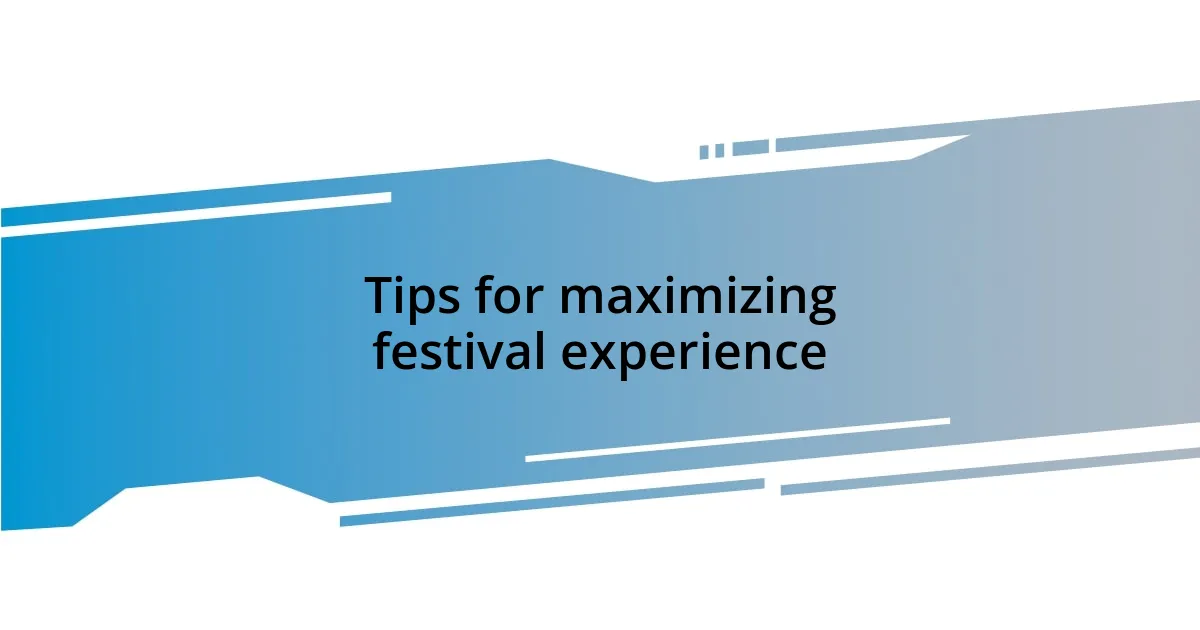
Tips for maximizing festival experience
Maximizing your festival experience often hinges on planning and research. I remember attending a festival last year, feeling overwhelmed by the schedule. To tackle this, I created a personal itinerary ahead of time, mapping out the must-see films and essential panels. Did you know that some of the most valuable insights can come from Q&A sessions after screenings? Prioritize those moments; they can answer questions you didn’t even know you had.
Diving deeper into the cultural offerings is another key strategy. One time, I stumbled upon an obscure film that wasn’t on my radar, and it completely shifted my perspective on storytelling. Embrace spontaneity—sometimes the unexpected experiences will resonate the most. Have you ever watched a film that didn’t attract much attention but moved you profoundly? Festivals are a goldmine for hidden gems, and keeping an open mind can lead to surprising discoveries.
Don’t forget to take mental notes during the festival. After a day filled with screenings and talks, I like to jot down my impressions and favorite moments at the end of each day. This practice helped me crystallize my thoughts and later informed my work. Remember, these reflections can serve as a valuable resource for your projects or discussions down the line. Why not try this when you attend your next festival? It’s an enriching way to capture the spirit of the event!





